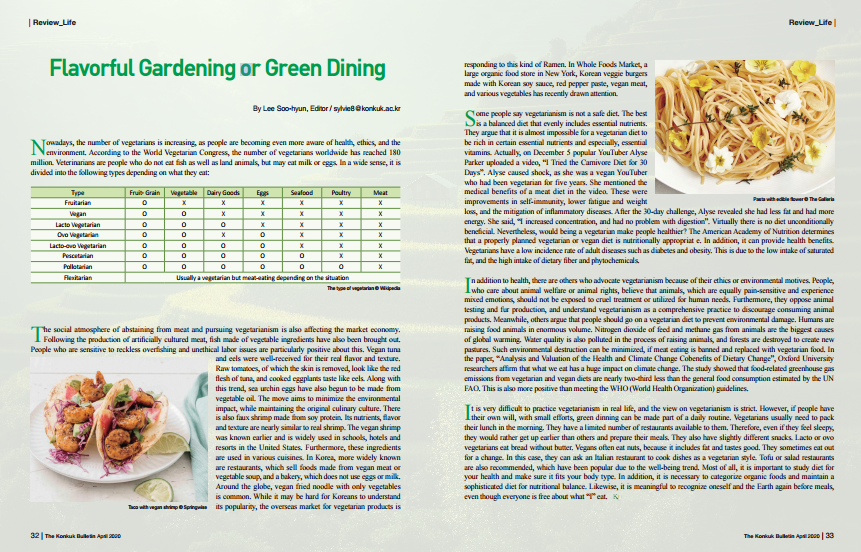
Nowadays, the number of vegetarians is increasing, as people are becoming even moreaware of health, ethics, and the environment. According to the World Vegetarian Congress, the number of vegetarians worldwide has reached 180 million. Veterinarians are people who do not eat fish as well as land animals, but may eat milk or eggs. In a wide sense, it is divided into the following types depending on what they eat:
The social atmosphere of abstaining from meat and pursuing vegetarianism is also affecting the market economy. Following the production of artificially cultured meat, fish made of vegetable ingredients have also been brought out. People who are sensitive to reckless overfishing and unethical labor issues are particularly positive about this. Vegan tuna and eels were well-received for their real flavor and texture. Raw tomatoes, of which the skin is removed, look like the red flesh of tuna, and cooked eggplants taste like eels. Along with this trend, sea urchin eggs have also begun to be made from vegetable oil. The move aims to minimize the environmental impact, while maintaining the original culinary culture. There is also faux shrimp made from soy protein. Its nutrients, flavor and texture are nearly similar to real shrimp. The vegan shrimp was known earlier and is widely used in schools, hotels and resorts in the United States. Furthermore, these ingredients are used in various cuisines. In Korea, more widely known are restaurants, which sell foods made from vegan meat or vegetable soup, and a bakery, which does not use eggs or milk. Around the globe, vegan fried noodle with only vegetables is common. While it may be hard for Koreans to understand its popularity, the overseas market for vegetarian products is responding to this kind of Ramen. In Whole Foods Market, a large organic food store in New York, Korean veggie burgers made with Korean soy sauce, red pepper paste, vegan meat, and various vegetables has recently drawn attention.
Some people say vegetarianism is not a safe diet. The best is a balanced diet that evenly includes essential nutrients. They argue that it is almost impossible for a vegetarian diet to
be rich in certain essential nutrients and especially, essential vitamins. Actually, on December 5 popular YouTuber Alyse Parker uploaded a video, “I Tried the Carnivore Diet for 30 Days”. Alyse caused shock, as she was a vegan YouTuber who had been vegetarian for five years. She mentioned the medical benefits of a meat diet in the video. These were
improvements in self-immunity, lower fatigue and weight loss, and the mitigation of inflammatory diseases. After the 30-day challenge, Alyse revealed she had less fat and had more energy. She said, “I increased concentration, and had no problem with digestion”. Virtually there is no diet unconditionally beneficial. Nevertheless, would being a vegetarian make people healthier? The American Academy of Nutrition determines that a properly planned vegetarian or vegan diet is nutritionally appropriate. In addition, it can provide health benefits. Vegetarians have a low incidence rate of adult diseases such as diabetes and obesity. This is due to the low intake of saturated fat, and the high intake of dietary fiber and phytochemicals.
In addition to health, there are others who advocate vegetarianism because of their ethics or environmental motives. People, who care about animal welfare or animal rights, believe that animals, which are equally pain-sensitive and experience mixed emotions, should not be exposed to cruel treatment or utilized for human needs. Furthermore, they oppose animal testing and fur production, and understand vegetarianism as a comprehensive practice to discourage consuming animal products. Meanwhile, others argue that people should go on a vegetarian diet to prevent environmental damage. Humans are raising food animals in enormous volume. Nitrogen dioxide of feed and methane gas from animals are the biggest causes of global warming. Water quality is also polluted in the process of raising animals, and forests are destroyed to create new pastures. Such environmental destruction can be minimized, if meat eating is banned and replaced with vegetarian food. In the paper, “Analysis and Valuation of the Health and Climate Change Cobenefits of Dietary Change”, Oxford University researchers affirm that what we eat has a huge impact on climate change. The study showed that food-related greenhouse gas emissions from vegetarian and vegan diets are nearly two-third less than the general food consumption estimated by the UN FAO. This is also more positive than meeting the WHO (World Health Organization) guidelines.
It is very difficult to practice vegetarianism in real life, and the view on vegetarianism is strict. However, if people have their own will, with small efforts, green dinning can be made part of a daily routine. Vegetarians usually need to pack their lunch in the morning. They have a limited number of restaurants available to them. Therefore, even if they feel sleepy,
they would rather get up earlier than others and prepare their meals. They also have slightly different snacks. Lacto or ovo vegetarians eat bread without butter. Vegans often eat nuts, because it includes fat and tastes good. They sometimes eat out for a change. In this case, they can ask an Italian restaurant to cook dishes as a vegetarian style. Tofu or salad restaurants are also recommended, which have been popular due to the well-being trend. Most of all, it is important to study diet for your health and make sure it fits your body type. In addition, it is necessary to categorize organic foods and maintain a
sophisticated diet for nutritional balance. Likewise, it is meaningful to recognize oneself and the Earth again before meals, even though everyone is free about what “I” eat.

